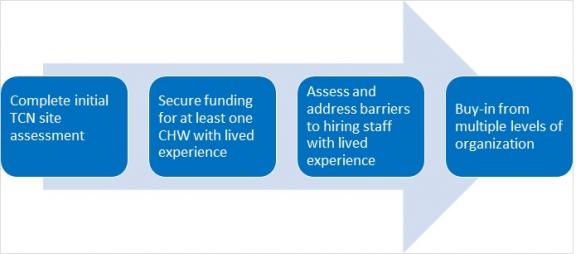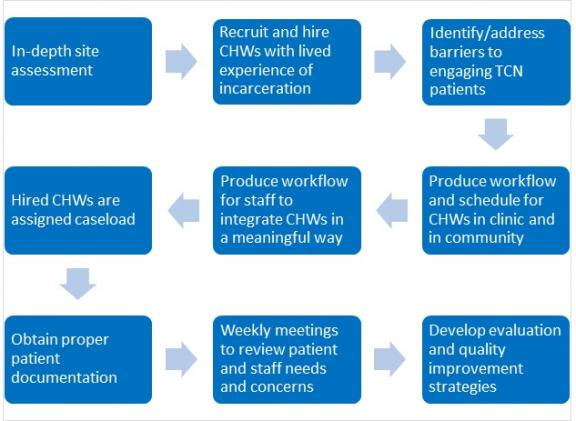Planning phase
The Transitions Clinic Network (TCN) supports health systems in implementing the TCN program. This evidenced-based program improves health and reentry outcomes for people with chronic health conditions returning from incarceration. TCN has supported 48 programs in 14 states and Puerto Rico in implementing a TCN program. Sites that are most successful in implementing this model share the following characteristics (or are working on them):
- Located in neighborhoods impacted by incarceration
- Offer integrated behavioral health services
- Providers who can prescribe medications for opioid use disorder (buprenorphine) onsite
- A clinical and administrative TCN program champion
- Open access scheduling structures
- Ability to waive or have flexibility around punitive polices such as canceling an appointment if someone is late
- Dedication to partnering with criminal, legal, and other reentry provider organizations
- Interest in addressing social determinants of health and partner with social service organizations
In order to become a TCN program partner, sites must:
- Commit to hiring a full-time community health worker with a history of long incarceration (preferably a felony conviction history)
- Have at least 2 dedicated staff members, including a program lead, committed to participating in the yearlong implementation process including monthly coaching calls
- Allow CHWs to spend half of their time in the community providing direct patient services.
- Demonstrate a commitment to health equity and improving the lives of people and communities impacted by incarceration
Planning: TCN partnership with primary care clinic

Implementation phase
In order to assure fidelity to this model of care, TCN leads sites through a structured yearlong implementation process that includes:
- Assessment of clinical site suitability for TCN program implementation
- In-depth coaching on addressing barriers and best practices in hiring a community health worker with lived experience of incarceration
- Monthly coaching calls focused on program implementation, CHW integration into primary care, and developing relationships with criminal, legal, and reentry partners
- Specialized 12-week online CHW training focused on skills related to working as part of a primary care team and working with people returning from incarceration
- Comprehensive training website with implementation toolkit and 11-part cultural humility training
- Basic evaluation and sustainability planning
Additionally, all TCN programs become part of the TCN national network and are included in annual network meetings, quarterly policy and continuing medical education events, and ongoing CHW mentorship and training opportunities.
Depending on the readiness of the clinic, implementation may overlap with planning. Some clinics may already have staff with lived experience who are ready for training, whereas other clinics may need more assistance in identifying key roles, cross-training, and hiring.
TCN collaborates closely with clinical and programmatic champions to assure fidelity to implementation and that the program utilizes the expertise of and meets the unique needs of the partner clinic.
TCN walks sites through each of the following processes throughout the year

This resource is adapted from materials provided by the Transitions Clinic Network.
To assess if your organization is a good fit for a TCN program or to learn more, contact TCN National Program Manager Anna Steiner at anna.steiner@ucsf.edu.
Learn more about Transitions Clinic Network Programs.
December 2021